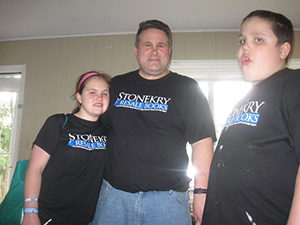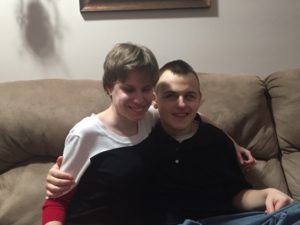Last year Easterseals published a guest post I wrote called How One Student Who is Blind Planned the Perfect Date. Our perfect date didn’t work out that time, unfortunately.
![That's Alicia and Joe sitting side by side on a beige couch at Christmastime. They started dating three years ago, on April 24, 2015.]()
Alicia and Joe.
Joe and I had tried to plan a trip to Andy’s Jazz Club in Chicago last year for our second anniversary, but when it didn’t work out, we tried again for this year. We have been planning this since December, so needless to say, I’d been looking forward to this for a very long time.
The day finally arrived. I was up early and scheduled our ride from campus to the Elburn train station, and I called Flash Cab Chicago to schedule two rides with them — from the train station to Andy’s, and from Andy’s back to the train station later that night. I informed them that we are both blind, so the driver would have to come get us. The dispatcher added this to her notes, and I could tell from her tone that this was nothing new to them.
The trip from Northern Illinois University to Elburn was nothing new to me. We got to the station just as the train was arriving; I could hear the loud train bells. The driver led us to the platform and onto the train, directed us to our seat, and told us to have a good day as she descended the stairs off the train. And as typical with traveling with Joe, the excited chatter started.
The hour-and-twenty minute train ride didn’t feel quite that long. We pulled in right on schedule, and my excitement quickly turned to nervousness. Here was something unfamiliar to me that I was not exactly confident about: getting off the train and out of the station. I was glad I’d scheduled our pick-up time with Flash Cab for 30 minutes after our train was due in Chicago. I overestimated the time it might take on purpose, just in case the train was late. Or in case it took us a while to get out of the station…or in case I needed to make a stop. Which I did.
I wasn’t sure who to ask. What if someone led us to the restroom and left and we couldn’t find someone to lead us back? I started voicing my worries out loud and, as per usual, Joe calmly said his favorite thing to say when traveling: “We’ll figure it out,” with a reassuring hold onto my hand.
The conductor guided us off the train and asked what we needed. “Well, our cab isn’t coming for a while, so I was wondering if you had an employee that could direct us to a restroom,” I said. I didn’t want to assume he would do it when he likely had other things to attend to, but he said he’d grab his bag and take us.
During the long walk to the restrooms, our conversation was all about what we were doing in the city today, how often we travel on the train, and how impressed he was by our confidence with this being our first trip to the city by ourselves. Once he’d led us to the restrooms, he told us he had another train to get to and informed us that a security guard would be there to lead us the rest of the way. He introduced himself and shook both our hands and departed.
As promised, the security guard was there when I exited. He led us to the exit on Madison Street, where I then received a text that our cab was on its way. There was more excited chatter (I said something like, “Can you believe it? We’re in Chicago!” like I’d never been to the city before in my life and was an out-of-state tourist.)
I received another text saying the cab arrived, but decided to stay put. I always let drivers come to me; I never try and find them. The driver addressed me by name, so I knew it was the right person.
The ride to the jazz club was short, and we arrived just as the dining area opened. Someone was there to greet us, and I gave them my last name for the reservation I had made two weeks ago. He led us to our table, and I immediately took note of the instruments I could hear to our right…very closely to our right. We were sitting right by the band!
Our server came by and asked if we needed help with the menus. Joe and I had done some research prior to this trip and looked up the menu online, but we quickly found out it had been updated since then. We narrowed down our options to pasta, and the server was happy to help.
He read everything and described it to us. He politely asked me to confirm where I got the menu online so they could update it, and I told him. We got our food right as the band began to play, so there wasn’t much conversation. It was too loud, and I was too busy enjoying the music anyway.
We spent two hours in the dining area (including eating dessert, of course), before we asked our server to lead us to the bar, where we quickly struck up conversation with a lady sitting next to me. She was visiting Andy’s Jazz Club for the first time, too.
The bar area was a little better. It was quieter so we could actually talk without having to shout. As soon as I got the text that our cab was on the way, we stood up and someone came over to help us. (People were watching out for us all evening.) They led us out the door just as the cab pulled up.
The cab driver led us into the station and found a security guard, who proceeded to use his radio to request assistance. Someone came and led us to the ticket agent, and once we had our tickets, the employee who led us to the agent then led us on the train.
Unlike the train ride to Chicago, the train ride back from Chicago was quiet. We were both exhausted, so we dozed off, but in-between sleep sessions we had a little bit of conversation. I couldn’t have asked for a better person to travel with and share the last three years of my life with. We talked about doing this as a yearly tradition — that’s how much fun we had.
Our train pulled up right on time, and my cousin met us at the platform to drive us back to campus. I can’t describe the feeling of accomplishment I felt at the end of it. I stepped out of my comfort zone and tried something new, and I knew I’d go back and do it again.
More posts by Ali:
 The United States edition of The Guardian is looking for stories from people who feel they’ve struggled to find or secure work because of their disability, but if you want your story included, you’re going to have to write it quickly: The deadline to submit is this Thursday, February 23, at midnight.
The United States edition of The Guardian is looking for stories from people who feel they’ve struggled to find or secure work because of their disability, but if you want your story included, you’re going to have to write it quickly: The deadline to submit is this Thursday, February 23, at midnight. Employment and having a disability (I have Asperger’s syndrome) can be a tricky combination. It can be even more difficult to navigate when one doesn’t know they are on the autism spectrum. I navigated my first several jobs not knowing (I was diagnosed at age 20).
Employment and having a disability (I have Asperger’s syndrome) can be a tricky combination. It can be even more difficult to navigate when one doesn’t know they are on the autism spectrum. I navigated my first several jobs not knowing (I was diagnosed at age 20). Aaron Likens, author of Finding Kansas: Decoding the enigma of Asperger’s Syndrome, and the National Autism Ambassador for Easterseals, has spoken to over 80,000 people at over 900 presentations and has given to the world a revelation of how the Autism Spectrum Disorder mind works. His willingness to expose his inner most thoughts and feelings has unveiled the mystery the Asperger’s mind. Join him on his journey from hopelessness to hope.
Aaron Likens, author of Finding Kansas: Decoding the enigma of Asperger’s Syndrome, and the National Autism Ambassador for Easterseals, has spoken to over 80,000 people at over 900 presentations and has given to the world a revelation of how the Autism Spectrum Disorder mind works. His willingness to expose his inner most thoughts and feelings has unveiled the mystery the Asperger’s mind. Join him on his journey from hopelessness to hope. On the day of my job interview, I turned from nervous to excited. At least, while I was on the bus.
On the day of my job interview, I turned from nervous to excited. At least, while I was on the bus.
 So it is absolutely exasperating for me to see other individuals with small dogs barely in a heel, barking at my service dog as we walk into a movie theater. On a plane, Leanna is in a tight tuck at my feet (left), sleeping, while a dog wearing a service dog vest jumps on people and begs them for food. Later, I hear barks and whines from their general direction.
So it is absolutely exasperating for me to see other individuals with small dogs barely in a heel, barking at my service dog as we walk into a movie theater. On a plane, Leanna is in a tight tuck at my feet (left), sleeping, while a dog wearing a service dog vest jumps on people and begs them for food. Later, I hear barks and whines from their general direction.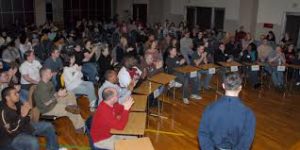

 February is Black History Month and at this time I find myself reflecting on prolific leaders who have come before me. Teachings of the past shape our present. This is something I’ve always known, but it is a truth that holds more significance as I embark on a new journey as President and CEO of Easterseals. In particular, Martin Luther King, Jr.’s legacy has always held a special place in my heart and inspired how I lead.
February is Black History Month and at this time I find myself reflecting on prolific leaders who have come before me. Teachings of the past shape our present. This is something I’ve always known, but it is a truth that holds more significance as I embark on a new journey as President and CEO of Easterseals. In particular, Martin Luther King, Jr.’s legacy has always held a special place in my heart and inspired how I lead.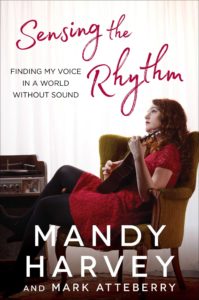 The publisher of Sensing the Rhythm summarizes Mandy Harvey’s memoir as “a deeply moving story about Mandy’s journey through profound loss, how she found hope and meaning in the face of adversity, and how she discovered a new sense of passion and joy.” Even though the publisher’s summary talks a lot about inspiration and overcoming adversity, I found this short book more approachable and relatable than I expected to.
The publisher of Sensing the Rhythm summarizes Mandy Harvey’s memoir as “a deeply moving story about Mandy’s journey through profound loss, how she found hope and meaning in the face of adversity, and how she discovered a new sense of passion and joy.” Even though the publisher’s summary talks a lot about inspiration and overcoming adversity, I found this short book more approachable and relatable than I expected to.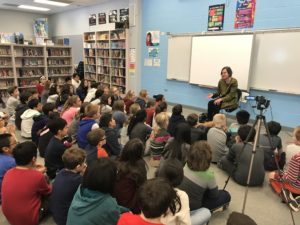
 Once I settled in after transferring colleges, I decided it was time to apply for a job.
Once I settled in after transferring colleges, I decided it was time to apply for a job. 
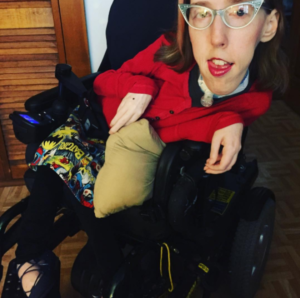

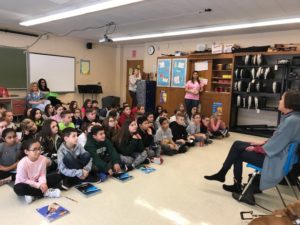
 This story is deeply personal. While it is interwoven with strong and sharp threads of Leroy’s and Dartanyon’s stories — and those of other key figures — this is Lisa’s story. From early childhood memories to blustering and fumbling her way to a dream job to high school wrestling matches and beyond, We get to know Lisa as a warm-hearted woman who yearns for a family. And she definitely gets her wish! We’re introduced to athletes, to coaches, to parents and siblings. We laugh, we cry, and we hope and despair. But, make no mistake, this is Lisa’s story.
This story is deeply personal. While it is interwoven with strong and sharp threads of Leroy’s and Dartanyon’s stories — and those of other key figures — this is Lisa’s story. From early childhood memories to blustering and fumbling her way to a dream job to high school wrestling matches and beyond, We get to know Lisa as a warm-hearted woman who yearns for a family. And she definitely gets her wish! We’re introduced to athletes, to coaches, to parents and siblings. We laugh, we cry, and we hope and despair. But, make no mistake, this is Lisa’s story. I don’t know what the weather is like where you are, but here in Chicago April has been cold, cold, cold — it snowed on the Cubs opening game day! I’m blaming the weather for it taking so long for me to acknowledge here on the Easterseals blog that April is Autism Acceptance Month.
I don’t know what the weather is like where you are, but here in Chicago April has been cold, cold, cold — it snowed on the Cubs opening game day! I’m blaming the weather for it taking so long for me to acknowledge here on the Easterseals blog that April is Autism Acceptance Month.